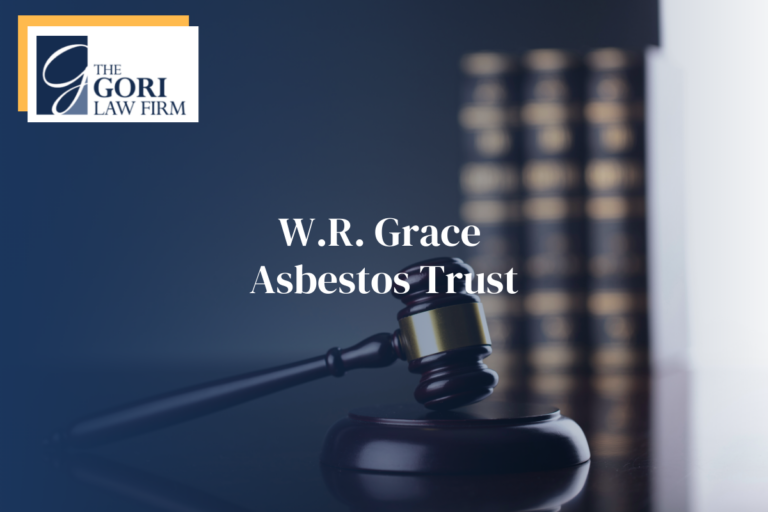W.R. Grace Asbestos Trust Fund

With more than $3 billion in funds, the W.R. Grace asbestos trust fund is one of the largest in the country. Since 2008, more than 130,000 claims have been filed with the trust to compensate victims of asbestos exposure caused by W.R. Grace, which previously owned and operated one of the largest vermiculite mines in the country and manufactured and sold countless asbestos products.
If you or a loved one were exposed to asbestos through a W.R. Grace product or worksite and have developed an asbestos-related disease like mesothelioma, you may be eligible to file a claim for compensation with the trust fund. Our skilled mesothelioma attorneys at The Gori Law Firm can help you file an asbestos trust fund claim and secure compensation for your illness and related losses.
- W.R. Grace exposed hundreds of thousands of people to asbestos through its negligent production and sale of asbestos-containing products, as well as its asbestos-tainted vermiculite mine.
- The W.R. Grace asbestos trust fund was formed to compensate victims of asbestos exposure for their losses and suffering.
- To qualify for an asbestos trust fund claim, you must meet medical and exposure-related requirements.
- Consulting a skilled asbestos attorney can ensure you file on time and with the right information to receive compensation.
W.R. Grace Asbestos Lawsuits
W.R. Grace exposed hundreds of thousands of people to asbestos through a vast supply chain of asbestos products and a notorious vermiculite mine in Libby, Montana. The company bought the mine in 1963 and, according to corporate records, knew in the early 1970s that the vermiculite was contaminated with asbestos and was endangering Libby residents. Though safer substitutes for most asbestos uses were available, W.R. Grace chose to protect its substantial profit margins rather than discontinue its use of asbestos.
As a result of the exposure that W.R. Grace caused, it has been listed as a defendant in well over 200,000 lawsuits, many of which were still ongoing when the company filed for bankruptcy in 2001. As part of bankruptcy proceedings, W.R. Grace was ordered to set up an asbestos trust fund to compensate asbestos exposure victims—a trust containing $3 billion.
W.R. Grace Asbestos Trust Eligibility Requirements
To secure mesothelioma compensation from the W.R. Grace asbestos trust fund, claimants need to meet certain eligibility requirements regarding their diagnosis and asbestos exposure. Additionally, the asbestos claim must be filed before certain deadlines, normally within two to three years from the date of diagnosis.
Medical Requirements
The medical requirements for W.R. Grace trust claimants include an eligible disease and evidence checklist. Patients must have been diagnosed with a listed condition through a physical exam by a physician or pathologist, there must be evidence of symptoms, and there must typically be at least a 10-year latency period since the date of first exposure. Some illnesses require additional documentation from doctors to demonstrate a causal link between asbestos exposure and the disease. Eligible asbestos-related diseases for the W.R. Grace trust include mesothelioma, cancer (e.g., lung cancer), asbestosis, and pleural diseases.
Exposure Requirements
To qualify for compensation from an asbestos trust fund, claimants must prove exposure to products containing asbestos that were manufactured, sold, distributed, or marketed by Grace, such as asbestos-containing vermiculite mined, milled, or processed by the company. Generally, claimants must prove at least six months of W.R. Grace-related exposure, though there are exceptions for claimants exposed for less time.
The W.R. Grace trust fund claim form asks applicants about the asbestos exposure sites and products. Many known asbestos exposure sites are on a pre-approved list. However, if a claimant’s exposure site is not listed, they can try to prove that W.R. Grace’s asbestos products were used at the site.

History of Asbestos Use in W.R. Grace Products
W.R. Grace & Company is well known for producing an insulation product called “Zonolite.” The company was founded in Peru in 1854 by William Russell Grace. Initially, the company produced fertilizer and gunpowder but quickly began producing machinery.
In 1899, the company was incorporated in New York. The company quickly expanded its production by acquiring chemical companies and eventually moved its corporate headquarters to Columbia, Maryland. Grace was the first corporation to open a foreign-owned factory in the People’s Republic of China, a sealing plant in Shanghai. Despite its success, W.R. & Company has a checkered history of criminal indictments.
W.R. Grace & Company manufactured a diverse line of asbestos products used in industrial settings and for insulation because they were inexpensive and heat-resistant. Most Grace products were used in the construction industry. Thus, many workers involved in the construction industry were exposed to deadly asbestos, particularly those involved with roofing, concrete, insulation, and waterproofing.
It is estimated that W.R. Grace & Company’s vermiculite mine in Libby, Montana, supplied about 80 percent of the nation’s insulation. The vermiculite in the Libby mine was contaminated with asbestos.
W.R. Grace Products Containing Asbestos
For much of the 20th century, asbestos-containing vermiculite and other products infiltrated countless homes across the U.S. Asbestos products were widely used in insulation, fireproofing, garden soil, fill dirt, and beyond.
W.R. Grace manufactured dozens of products with asbestos-tainted vermiculite—especially insulation, plaster, fireproofing materials, and cement. Some of the W.R. Grace products known to have contained asbestos include:
- Zonolite Super 40
- Zonolite Masonry Insulation
- Zonolite Plaster: Dry plaster compound
- Zonolite Acoustical Plaster
- Zonolite Attic Insulation
- Zonolite Econowhite
- Zonolite Insulating Cement
- Zonolite MK-1 and MK-2 Insulation
- Zonolite Spraytex
- Zonolite Super 40 Spray Surfacer
- Zonolite Fireproofing
- Zono-coustic
- Monokote Cement
- Monokote Fireproofing
Jobs at High Risk of Exposure to Asbestos in W.R. Grace Products
W.R. Grace exposed thousands of people in the mining, manufacturing, and construction industries to asbestos and asbestos-containing products. Some of the professions at the highest risk of asbestos exposure through W.R. Grace include:
Don't Wait — File Your W.R. Grace Asbestos Trust Claim Today
If you or a loved one were exposed to asbestos through a W.R. Grace product or work site, you may be eligible to pursue compensation through a W.R. Grace asbestos trust fund claim. It’s crucial to act fast to avoid missing important deadlines. At The Gori Law Firm, our attorneys are well-versed in asbestos claims and can file your claim quickly, efficiently, and correctly to increase the chances of securing the compensation you deserve for your diagnosis.
Since 2008, The Gori Law Firm has recovered more than $4 billion in case results for victims of asbestos exposure across the country. With over 100 years of combined legal experience, our mesothelioma law firm works closely with clients to provide the personalized support and resources they need while we handle their cases.
If you allow our mesothelioma attorneys to review your case, we will donate to the Mesothelioma Applied Research Foundation. Contact The Gori Law Firm today for a free, zero-obligation case review by calling (618) 659-9833 or filling out our online contact form.


